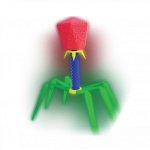Nanobots
Nanobots are a resource that is unlocked after destroying the fifth planet.
The primary use of Nanobots is to kill the last percentage of a planet's population, which is usually harder to infect by using only Bacteria. Just like Bacteria, Nanobots are lost when attacking a planet or entering a Black Hole.
Nanobot Production is unlocked after destroying the fifth planet. Nanobots can be produced by Scientists.
After researching Quantum Robotics at the Dark Matter Institute, the player has a 0.1% chance to produce a Nanobot on tap. Dark Matter Institute also has the Dark Engineering technology, which increases Nanobot strength by 25%.
After Atreria, all planets have Nanobot resistance, which reduces Nanobot strength. Nanobot strength is not influenced by added infectivity bonus.
Attacking Planets
The percentage of population destroyed by Nanobots is calculated according to the formula
where
- Population Destroyed - how many percent of the initial planet population will be destroyed by Nanobots in the current attack
- Nanobot Count - the current number of Nanobots owned by the player.
- Nanobot Resistance Coefficient - a number that is determined by the Nanobot resistance of the current planet.
- Nanobot Strength - a multiplier that is set at 1 by default and is multiplied by any increases to Nanobot strength, such as Planetary Research discoveries and Dark Matter Institute technologies.
Modifiers
The effectiveness of Nanobots in planet attacks is influenced by two modifiers: Nanobot strength and Nanobot resistance.
It, however, is not influenced by player's infectivity and planetary shields.
Nanobot Resistance Coefficient
Nanobot resistance coefficient is determined from the Nanobot resistance of the current planet.
| Planet Number | Nanobot Resistance | Nanobot Resistance Coefficient |
|---|---|---|
| 1-7 | none | 2 |
| 8-11 | basic | 1.5 |
| 12-16 | low | 1 |
| 17-22 | medium | 0.5 |
| 23-29 | high | 0.2 |
| 30-37 | advanced | 0.1 |
| 38-46 | exceptional | 0.07 |
| 47-59 | extreme | 0.04 |
| 60+ | perfect | 0.01 |

